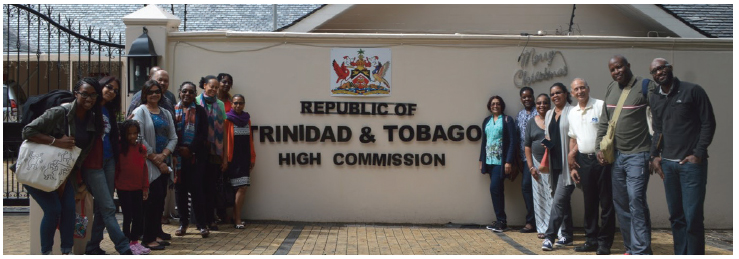
South Africa is a country not afraid of its scars. From Apartheid-era sites such as Robben Island, prison to Nelson Mandela and numerous other political prisoners; to the sprawling townships; to the stories of the era that have been immortalised in literature, drama and song; South Africans wear their history with pride.
“Everybody – white, black, coloured, Indian, they are very proud to be South African,” says Afiya Francis, Study Tour Coordinator with The UWI’s International Office. “There is great pride among the people.”
Ms. Francis and a group comprising UWI senior administrators, faculty, current and retired staff, teachers and family members had an incredible opportunity to immerse themselves in the culture of South Africa on a 17-day study tour of the country. The tour, beginning at the end of 2016 and continuing into 2017, was part of the International Office’s “UWI Discovers” series.
“UWI Discovers South Africa” focused on several topics – the history and culture of the country, conflict resolution, and the post-Apartheid experience. One of the most impactful aspects of the trip was the interaction with figures from the anti-Apartheid movement, the movement for gender equality, and the arts and academia. This was facilitated by Professor Rhoda Reddock, Deputy Principal of the St. Augustine Campus, who also took part in the study tour.
“Thanks to Professor Reddock we met a lot of very influential people,” says Ms. Francis. “We shared discussion about their struggles and triumphs.”
At their first stop in Johannesburg, the group was hosted by the Sisulu family – writer and activist Elinor Sisulu, and her husband, well-known national politician Max Sisulu. Max is the son of famed anti-apartheid activists Walter and Albertina Sisulu, two close associates of Nelson Mandela. While in Johannesburg they also visited Soweto, one of the historic centres of resistance against the Apartheid regime.
The UWI study tour continued on to the Pilanesberg Game Reserve and the Cradle of Humankind, a World Heritage site that contains the fossils of near-human ancestors that are over 2 million-years old.
The final stop on the tour was Cape Town, where they were hosted by author, historian and cricketer, Professor Andre Odendaal and women’s rights activist, writer and educator Professor Gertrude Fester. Through Professor Fester, The UWI group was able to meet with many of the women who played a role in the movement against Apartheid in Cape Town. Among them was Mrs. Mildred Lesia Ramakaba, a warrior for racial, gender and economic justice in South Africa for over half a century.
One of the most striking aspects of the journey, says Ms. Francis, was the country’s resemblance to Trinidad and Tobago:
“I think a lot of people were very much amazed at how similar South Africa is to T&T, particularly with regard to the ethnic make-up of the country. In terms of the struggles they face, obviously they are not as intense here, but some of the things we had to deal with are similar.”
Started in 2012, UWI Discovers gives students, staff and a cross-section of society an opportunity to visit and learn about countries within and beyond the region. Participants become better versed in several aspects of these societies and the opportunities for the Caribbean to engage in constructive partnerships. “UWI Discovers China” will take place in 2017.

For more information on UWI Discovers and the International Office, visit https://sta.uwi.edu/discover/ and email afiya.francis@sta.uwi.edu . |





